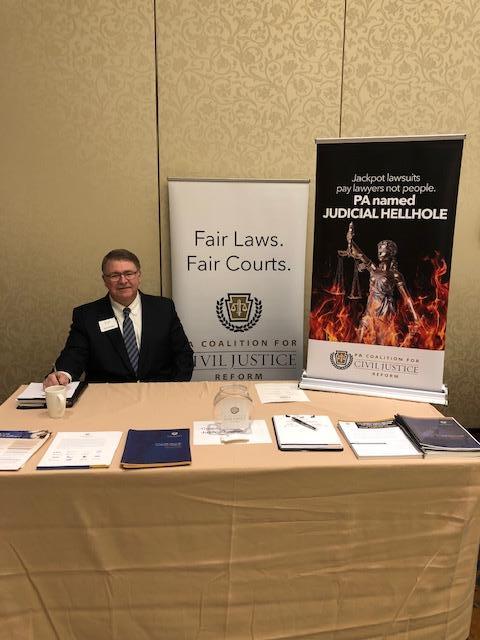Due Process in PA * Bills Signed Into Law * PCCJR Takes Litigation Reform to PLC * In the News
Due Process Considerations in Jurisdictional Questions: A Dead Issue in PA?
The Pennsylvania Superior Court recently ruled that Pennsylvania has jurisdiction over any corporation that registers to do business in the state, upholding the consent provision of the Long Arm Statute.
By Curt Schroder, Executive Director, PCCJR
Pennsylvania’s Long-Arm Statute, 42 Pa. C.S.A. §5301(a), imposes “general” jurisdiction over any foreign corporation (out of state) that has merely registered to do business in Pennsylvania. This so-called “consent jurisdiction” is the subject of an appeal to the Superior Court in the case Mallory v. Norfolk Southern Railway Co., a case that should be watched closely by every corporation registered to do business in Pennsylvania.
In the lower court, Judge New of the Philadelphia Court of Common Pleas, held that the Long Arm Statute as applied by the Plaintiff violated constitutional due process as determined by the U.S. Supreme Court in Daimler AG v. Bauman, 571 U.S. 117 (2014). The Daimler court specifically rejected, as “unacceptably grasping,” legal theories that “approve the exercise of general jurisdiction in every State in which a corporation engages in a substantial, continuous, and systematic course of business.” Under Daimler, it is not enough that a defendant does business in a state. The defendant must be “at home” in the state to meet the Due Process requirements of the 14th Amendment. Judge New held that, “by wrapping general jurisdiction in the cloak of consent, Pennsylvania’s mandated corporate registration attempts to do exactly what the United States Supreme Court prohibited.” Mallory v. Norfolk Southern Railway Co., 2018 WL 3025283, at (Pa. C.P. Phila. Co. May 30, 2018).
The Pennsylvania Superior Court recently ruled that Pennsylvania has jurisdiction over any corporation that registers to do business in the state, upholding the consent provision of the Long Arm Statute. In doing so the Superior Court is actually saying that Pennsylvania may require a corporation, as a condition precedent to obtaining a permit to do business within the State, to surrender a right and privilege secured to it by the Constitution.
The Pennsylvania Defense Institute, Philadelphia Association of Defense Counsel, and the Washington Legal Foundation have filed an amicus brief asking the Superior Court to uphold Judge New’s decision that the Long Arm Statute violates Due Process.
Bills Signed Into Law in Pre-Election Flurry of Activity
Two bills of interest to supporters of civil litigation reform became law in the final days of the legislative session before the November 6 election.
Act 111, formerly House Bill 1840 (R-Kauffman) is a legislative fix to the Supreme Court’s ruling (Protz vs Workers’ Compensation Appeal Board) invalidating a provision of the PA 1996 Workers’ Compensation reforms that allows employers to request an Impairment Rating Evaluation (IRE) after an injured worker has been out of the workplace for 104 weeks. The IRE process helps to lower workers’ compensation costs by providing certainty for insurers and employers, as well as injured workers, and it incentivizes injured workers to return to work. The Court did not find any constitutional problems with the IRE process itself but disagreed with the method the Act provided for updates to the standards for evaluating a worker’s degree of impairment.
This legislation was narrowly focused to address the PA Supreme Court’s decision and prevent the significant increases in workers’ compensation insurance premiums that employers would have experienced as the result of this decision. It clarifies the guidelines to be used for the IRE’s and makes no substantive policy changes. The bill passed the Senate Y: 34/N: 15 and was signed into law by the governor on October 24, 2018.
Act 98, formerly House Bill 544 (R-Moul) amends the state’s recreational use of land liability law in order to expand liability protections for landowners who open their property for recreational uses.. The bill passed the Senate by a vote of Y: 49/N: 0 and was signed into law by the governor on October 24, 2018.
PCCJR Takes Litigation Reform To PLCExecutive Director, Curt Schroder, attended the meeting of the Pennsylvania |
In the News
Med mal focused| Med Mal Disputes Highlight Pa. Supreme Court Argument Session | The Legal Intelligencer
Conduct unbecoming| This ‘mockery of the law’ in Lancaster is unbelievable, but unfortunately true | PennRecord



 Leadership Conference in King of Prussia, PA last week. This was a first of its kind meeting in southeast PA for the PLC. The PLC is an organization of grassroots activists with interests in many issues. Schroder shared materials on civil justice reform with those in attendance, including the PCCJR Voter Guide for 2018.
Leadership Conference in King of Prussia, PA last week. This was a first of its kind meeting in southeast PA for the PLC. The PLC is an organization of grassroots activists with interests in many issues. Schroder shared materials on civil justice reform with those in attendance, including the PCCJR Voter Guide for 2018.